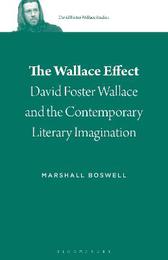
|
The Wallace Effect: David Foster Wallace and the Contemporary Literary Imagination
Hardback
Main Details
Description
The Wallace Effect explores David Foster Wallace's contested space at the forefront of 21st-century American fiction. Pioneering Wallace scholar Marshall Boswell does this by illuminating "The Wallace Effect"-the aura of literary competition that Wallace routinely summoned in his fiction and non-fiction and that continues to inform the reception of his work by his contemporaries. A frankly combative writer, Wallace openly challenged his artistic predecessors as he sought to establish himself as the leading literary figure of the post-postmodern turn. Boswell challenges this portrait in two ways. First, he examines novels by Wallace's literary patriarchs and contemporaries that introduce innovations on traditional metafiction that Wallace would later claim as his own. Second, he explores four novels published after Wallace's ascendency that attempt to demythologize Wallace's persona and his literary preeminence. By re-situating Wallace's work in a broader and more contentious literary arena, The Wallace Effect traces both the reach and the limits of Wallace's legacy.
Author Biography
Marshall Boswell is Professor and Chair of English at Rhodes College, USA. He is the author of four books, including Understanding David Foster Wallace (2004) and John Updike's Rabbit Tetralogy: Mastered Irony in Motion (2001), and the editor of three books, including David Foster Wallace and 'The Long Thing' (Bloomsbury, 2014) and A Companion to David Foster Wallace Studies (co-editor, 2013). He served as Guest Editor for a two-part special issue of Studies in the Novel devoted to David Foster Wallace's novels.
ReviewsBoswell's collection of essays plays a significant role in Wallace scholarship. With his intertextual examinations of the novels and stories against the work of his peers, Boswell zeroes in on the depth and breadth of Wallace's vision. * Orbit: A Journal of American Literature * One measure of literary accomplishment is the resistance and resentment that a writer provokes in other writers, and by that measure David Foster Wallace's accomplishment was undeniably major. It takes a scholar of Marshall Boswell's resourcefulness and perspicacity to show us exactly how this is so, as he does in this eye-opening book. * Brian McHale, Distinguished Professor of English, The Ohio State University, USA, and author of Postmodernist Fiction (1987) * The Wallace Effect is the most extended and fruitful exploration of David Foster Wallace's influence on his literary contemporaries to date. Noting the sea change in American literature that Wallace's writing heralded, Boswell charts the novelistic courses of a number of writers who anxiously beat back against the resulting new current in compelling ways. Boswell demonstrates that whether these writers' works question, negotiate with, or condemn Wallace, what remains undeniable is Wallace's deep and lasting effect on contemporary literature. In The Wallace Effect, Wallace emerges as a formidable author who inspires writers and readers alike both to embrace and resist his legacy. * Ralph Clare, Associate Professor of English, Boise State University, USA, and editor of the Cambridge Companion to David Foster Wallace (2018). * Marshall Boswell, a pioneer in the study of Wallace, writes with dexterity and lucidity here about some of the author's favorite subjects: influence, autobiography, self-consciousness, and the need for literature to respond to what came before. Catching allusions and subtle critiques at every turn, Boswell weaves together predecessors, successors, and the man himself in a way that readers will find both instructive and fascinating. * Jeffrey Severs, Associate Professor of English, University of British Columbia, Canada, author of David Foster Wallace's Balancing Books: Fictions of Value (2017) *
|